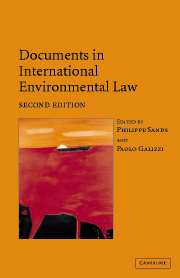Book contents
- Frontmatter
- Contents
- Preface
- PART I General instruments
- PART II Atmosphere
- PART III Oceans: global
- PART IIIB Oceans: regional
- PART IV Freshwater resources
- PART V Biodiversity
- 16 International Convention for the Regulation of Whaling, 2 December 1946
- 17 Convention on Wetlands of International Importance Especially as Waterfowl Habitat, 2 February 1971
- 18 Convention Concerning the Protection of the World Cultural and Natural Heritage, 16 November 1972
- 19 Convention on International Trade in Endangered Species of Wild Fauna and Flora, 3 March 1973
- 20 Convention on the Conservation of Migratory Species of Wild Animals, 23 June 1979
- 21 Convention on Biological Diversity, 5 June 1992
- 21A Cartagena Protocol on Biosafety to the Convention on Biological Diversity, 29 January 2000
- 22 Non-Legally Binding Authoritative Statement of Principles for a Global Consensus on the Management, Conservation and Sustainable Development of All Types of Forests, 13 June 1992
- 23 United Nations Convention to Combat Desertification in Countries Experiencing Serious Drought and/or Desertification, Particularly in Africa, 17 June 1994
- PART VIA Hazardous substances and activities: nuclear
- PART VIB Hazardous substances and activities: pesticides
- PART VIC Hazardous substances and activities: waste
- PART VII Human rights and the environment
- PART VIII War and the environment
- PART IX Trade and the environment
- PART X Environmental impact assessment and access to information
- PART XI Liability for environmental damage and breaches of environmental obligations
- PART XII The Antarctic
17 - Convention on Wetlands of International Importance Especially as Waterfowl Habitat, 2 February 1971
Published online by Cambridge University Press: 05 June 2012
- Frontmatter
- Contents
- Preface
- PART I General instruments
- PART II Atmosphere
- PART III Oceans: global
- PART IIIB Oceans: regional
- PART IV Freshwater resources
- PART V Biodiversity
- 16 International Convention for the Regulation of Whaling, 2 December 1946
- 17 Convention on Wetlands of International Importance Especially as Waterfowl Habitat, 2 February 1971
- 18 Convention Concerning the Protection of the World Cultural and Natural Heritage, 16 November 1972
- 19 Convention on International Trade in Endangered Species of Wild Fauna and Flora, 3 March 1973
- 20 Convention on the Conservation of Migratory Species of Wild Animals, 23 June 1979
- 21 Convention on Biological Diversity, 5 June 1992
- 21A Cartagena Protocol on Biosafety to the Convention on Biological Diversity, 29 January 2000
- 22 Non-Legally Binding Authoritative Statement of Principles for a Global Consensus on the Management, Conservation and Sustainable Development of All Types of Forests, 13 June 1992
- 23 United Nations Convention to Combat Desertification in Countries Experiencing Serious Drought and/or Desertification, Particularly in Africa, 17 June 1994
- PART VIA Hazardous substances and activities: nuclear
- PART VIB Hazardous substances and activities: pesticides
- PART VIC Hazardous substances and activities: waste
- PART VII Human rights and the environment
- PART VIII War and the environment
- PART IX Trade and the environment
- PART X Environmental impact assessment and access to information
- PART XI Liability for environmental damage and breaches of environmental obligations
- PART XII The Antarctic
Summary
Editorial note
The Convention on Wetlands of International Importance Especially as Waterfowl Habitat, adopted under the auspices of UNESCO, requires Parties to promote the conservation of listed wetlands and the ‘wise use’ of wetlands in their territory (Article 3(1)).When becoming a Party, each State must nominate at least one suitable wetland to the List of Wetlands of International Importance on the basis of their ecology, botany, zoology, limnology or hydrology, without prejudicing its exclusive sovereign rights over these wetlands (Article 2). Conservation of all wetlands is to be promoted by establishing natural reserves on them with adequate wardening (Article 4(1)). If a Party changes the boundary of a listed wetland in its ‘urgent national interest’, it should compensate for the loss of wetland resources by creating additional reserves for the protection of an ‘adequate’ portion of the habitat (Article 4(2)).
Parties are required to consult each other on implementing the Convention with a view to co-ordinating and supporting present and future policies concerning conservation of wetlands and their flora and fauna (Article 5). The Convention also encourages research, exchange of data, training of personnel, and consultation between parties about implementing their obligations (Articles 4(3)). An extraordinary Conference of the Parties held in 1987 amended Articles 6 and 7 (Regina Amendments) establishing a Conference of the Parties which meets regularly to review the implementation of the Convention. The amendments entered into force on 1 May 1994, but have not been ratified by all Parties to the Convention. Bureau duties for the Convention are performed by the International Union for the Conservation of Nature (Article 8).
- Type
- Chapter
- Information
- Documents in International Environmental Law , pp. 636 - 643Publisher: Cambridge University PressPrint publication year: 2004



